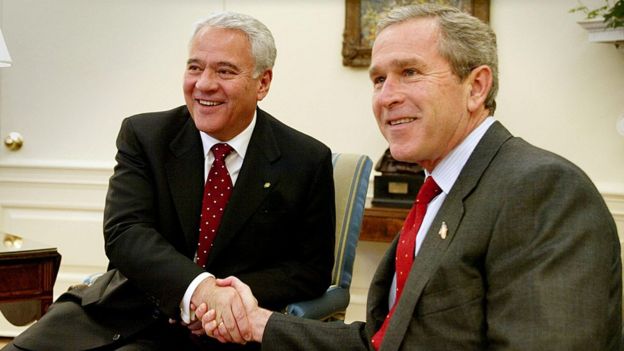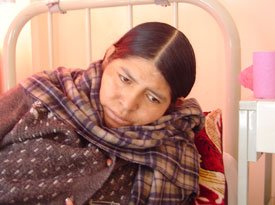Latin America
Related: About this forumPanel Asked to Reinstate $10M Award for Bolivian Massacre
Panel Asked to Reinstate $10M Award for Bolivian Massacre
November 19, 2019
IZZY KAPNICK
MIAMI (CN) – For relatives of those slain in the Bolivian military’s clash with protesters during the country’s Gas War, seeking justice in the U.S. court system has been a painful and winding path.
Suing over the deaths of eight slain Bolivians, the plaintiffs have battled in U.S. federal courts for more than a decade in hopes of holding then-president Gonzalo Sanchez de Lozada liable for what they describe as a coordinated massacre of unarmed residents amid civil unrest in Bolivia in 2003.
. . .
The verdict was promptly thrown out by the Miami judge who oversaw the trial. A few weeks after the trial wrapped up and the verdict was entered, the judge ruled that the plaintiffs had failed to substantiate their claims that there was a campaign of civilian atrocity, as opposed to a chaotic clash between soldiers and violent protesters.
. . .
One Bolivian soldier testified that he and his peers were ordered to shoot “anything that moved.” According to the soldier, military units were told to fire upon civilians even if they were in their homes. One commander purportedly said to the soldiers, “If you see a fly, shoot.”
Villagers were being beaten, and soldiers were spouting ethnic insults against the indigenous Aymara residents, according to pleadings submitted in the lower court.
More:
https://www.courthousenews.com/panel-asked-to-reinstate-10m-award-for-bolivian-massacre/
~ ~ ~

Gonzalo Sanchez de Lozada
Gee, it only seems like last year when:
APRIL 3, 2018 / 6:23 PM / 2 YEARS AGO
U.S. jury finds ex-Bolivia leader responsible for civilian deaths
Danny Ramos
3 MIN READ
LA PAZ (Reuters) - A U.S. jury on Tuesday found former Bolivian President Gonzalo Sanchez de Lozada and his defense minister responsible for civilian deaths during 2003 street protests in Bolivia, awarding $10 million in compensatory damages to victims’ families.
The civil lawsuit was brought a decade ago by eight families whose relatives died during a period of unrest in the poor South American nation. The case went to trial at a federal court in Fort Lauderdale, Florida.
The plaintiffs accused Bolivia’s former government leaders of ordering the military to use violence to crack down on demonstrations against a plan to export natural gas through neighboring Chile.
Defense lawyers representing the former leaders said they would seek to overturn the verdict.
The protests during the so-called gas wars in Bolivia left more than 60 people dead and hundreds injured. Sanchez de Lozada, a U.S.-educated mining magnate, and his former defense minister Carlos Sanchez Berzain resigned in October 2003. Both now reside in the United States.
More:
https://www.reuters.com/article/us-usa-bolivia-trial/u-s-jury-finds-ex-bolivia-leader-responsible-for-civilian-deaths-idUSKCN1HA2W4
~ ~ ~
There's a woman who was NOT counted as one of the executed protesters by Goni's military, as she lived on in agony for months until she died. I posted it years ago in this forum:
Memory’s Struggle Against the Labyrinth of Power
The Trial of Former Bolivian President Sánchez de Lozada and His Accomplices for the Massacres of 2003
By Luis A. Gómez
Part One of a Special Series for The Narco News Bulletin
December 21, 2004
On the morning of October 15, 2003, while the demonstrations that two days later would take down a president spread through La Paz and El Alto, the mineworkers’ leaders of Oruro province decided to march to the capital to support the rebels. In the La Salvadora mine, a 36-year-old woman, widow, and mother of six children between the ages of two and twelve, joined the miners’ contingent. Filomena León, who months later would tell her story before the cameras of Verónica Auza and Claudia Espinoza, was among the people who arrived that morning in the town of Patacamaya, a little more than 100 kilometers (60 miles) from La Paz.
“I don’t know how they surprised us. We were getting out of the car peacefully to drink some tea.”
The soldiers had orders to stop the caravan, and held back the miners with gunshots. First, they burst the tires on the miners’ trucks and seized their few belongings, then they attacked the miners, who, armed with sticks of dynamite, resisted the offensive. The palliri (woman miner) was among those injured in the clash. “I felt the bullet, just the bullet. I haven’t risen since. I was ahead of the soldiers and the bullet entered me from behind. I don’t remember anything else.” The high caliber projectile embedded itself in Filomena’s spinal cord. For months, in at least two public hospitals, the brave woman slowly lost her health and will to live; she was paralyzed, and her younger children couldn’t even recognize her.
On April 30, nearly six months after being shot, Filomena León died of a lethal infection at the La Paz Clinic Hospital, according to the Gas War Memorial Testimony – a book put together by Auza and Espinoza to record the dozens of deaths, the hundreds of wounded and mutilated, that were the high price paid by the Bolivian insurrection last year. In the last weeks of her life, one could see a fist-sized hole in her back. Filomena’s sweet voice and black, abundant braids left this land forever. The same happened to Teodocia Morales Mamani (who was pregnant), Marcelo Chambi Mollinedo, Ramiro Vargas Astilla, and many other Alteños (from the city of El Alto), Aymara peasant-farmers, children and grandparents, men and women. And today, despite the Bolivian National Congress having authorized their prosecution, those responsible for so much pain go unpunished.
The Death Sentence
In a story of courage and strength, Bolivia’s poor, most importantly its Aymara indigenous population, defended their natural gas in September and October of last year, blockading highways and paralyzing El Alto and La Paz. Gonzalo Sánchez de Lozada, serving his second term as president, hoped to export this valuable natural resource to the United States through Chilean ports, against the will of the people. During the conflict, soldiers and police constantly fired on people armed only with sticks, stones, and occasionally dynamite. As in the case of the Zapatistas in Chiapas, Mexico, or of the insurrection in Argentina in 2001, the repressive forces of the Bolivian state had “orders from above”; a license to kill.
More:
http://www.narconews.com/Issue35/article1138.html

Philomena Leon's image during her struggle.
~ ~ ~
Goni, From Wikipedia:
Political life
The son of a political exile, Sánchez de Lozada spent his early years in the United States, where he attended boarding school at Scattergood Friends School in rural Iowa.[2] He studied literature and philosophy at the University of Chicago. As a result of this experience, his Spanish is accented,[3] leading many Bolivians to refer to him as "El Gringo."
More:
https://en.wikipedia.org/wiki/Gonzalo_S%C3%A1nchez_de_Lozada
Just the kind of guy who honors his people by slaughtering them in the streets.